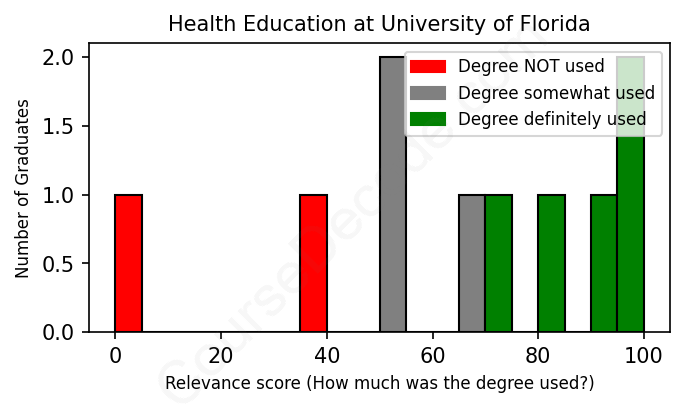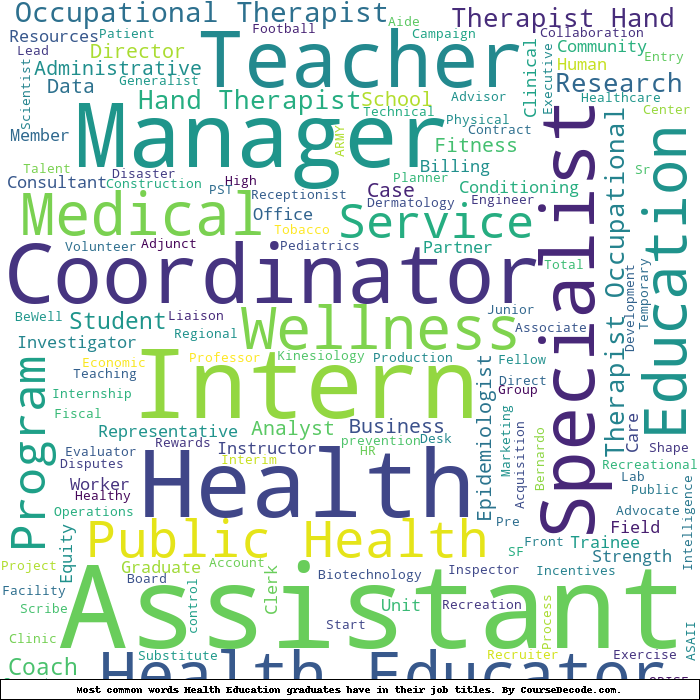
First, some facts. Of the Health Education graduates from University of Florida we've analyzed , here's how many have used (or NOT used) their degree in their career:

These are estimates based on AI analysis of 10 LinkedIn profiles (see below).
The verdict? Slightly below average. Overall, with an average relevance score of 65%, Health Education graduates from University of Florida have a slightly lower likelihood (-2%) of finding work in this field compared to the average graduate across all fields:
And for comparison, here's the chart for all profiles we've looked at across all degrees.
Also, after graduating, 40% of these graduates have pursued further education other than another Bachelor's degree (such as a Masters degree or other), compared to the average across all profiles of 35%. This suggests you may need more than just a Bachelors degree to be competitive as a Health Education graduate.
See the details:
|
Relevance score: 35% We think this person has NOT gone into a career related to their degree. We think this person has NOT gone into a career related to their degree.
DEGREE INFOGraduated in 2014 from University of Florida with a Bachelor of Science (B.S.) in Health Education. Also pursued further education since (see below). JOB HISTORY SINCE GRADUATIONIntern, Wellness Coach/Health Education Baptist Health Jan 2014 - Apr 2014 Billing Specialist  nThrive Mar 2015 - Nov 2017 Office Specialist/ Medical Assistant  Baptist Health Nov 2017 - Aug 2019 Medical Assistant  Nemours Sep 2019 - Apr 2023 FURTHER DEGREES DONE SINCE GRADUATINGMastersAdventHealth University 2023 - 2025 ABOUTExperienced healthcare professional with a demonstrated history of working in the hospital & health care industry. Skilled in Leadership, Health Program Planning, Health Education, Cardiopulmonary Resuscitation (CPR), and Computer Literacy. Strong healthcare services professional with a Bachelor of Science (B.S.) focused in Health Education from University of Florida. |
The top 10 most common jobs done by the graduates we've analyzed (ranked most common to least) are:
From the analysis of LinkedIn profiles of individuals who graduated with a degree in Health Education from the University of Florida, it seems that most of the common job roles fall into the healthcare and rehabilitation categories, particularly in roles as Occupational Therapists and Medical Assistants. These positions utilize health education principles extensively, especially in direct patient interactions where educating clients about their health, rehabilitation practices, and wellness strategies is crucial. It's interesting to see that many Occupational Therapists often work in environments where they can apply their education actively, making their jobs highly relevant to their degree.
However, not all jobs held by these graduates align closely with health education. Many graduates ventured into fields like human resources, administrative roles, or even customer service jobs that don’t leverage their health education background. For instance, positions such as receptionists or HR business partners lack a direct connection to health education knowledge. Overall, while the healthcare-related positions are clearly relevant, a significant portion of this group ended up in roles that strayed away from their educational focus, indicating a varied job market where not every opportunity fully embraces the skills gained from a Health Education degree.
Here is a visual representation of the most common words in job titles for Health Education graduates (this is across all Health Education graduates we've analyzed, not just those who went to University of Florida):

When looking at the career trajectories of graduates from the University of Florida who studied Health Education, it seems that the first jobs tend to vary quite a bit. A significant number of graduates land roles in healthcare settings soon after graduation, like health unit coordinators and medical assistants, suggesting that many kickstart their careers in direct support roles within medical environments. However, there are also graduates who venture into more diverse fields such as human resources and account management, which indicates that some may drift away from traditional health-related careers right off the bat. Internships appear to be common among these early-career roles, especially in health education-focused settings, but there’s a notable percentage that pivots to unrelated fields.
Fast forward five to ten years later, and many of these graduates seem to solidify their positions in health-oriented careers, with several professionals transitioning into more specialized roles like occupational therapists and public health advisors. This shift demonstrates a growth in focus towards the health field over time, as individuals build expertise and experience. However, there are certainly some who have landed in HR and various corporate roles, which might not align closely with their health education background. So, while there are definitely success stories where alumni end up in impactful health-related careers, the journey isn’t uniform, and not everyone is leveraging their degree in a way that directly connects to health education. Overall, it’s a mixed bag, showcasing both dedication to the health sector and the flexibility of their degrees to allow for alternative career paths.
So, getting a Bachelor’s degree in Health Education at the University of Florida, or really anywhere, can be a bit of a mixed bag. It's not super easy, but it's not the hardest major out there either. You’ll definitely need to stay on top of your assignments, and classes can involve a fair amount of reading and projects, especially if you're diving into subjects like public health, health psychology, and community health. A lot of people find it manageable if they stay organized and keep up with their studies. Just like any degree, it has its challenging moments, but if you're genuinely interested in health topics and helping others, you might find it pretty rewarding. Overall, it falls somewhere around average in terms of difficulty!
Most commonly, in the LinkedIn profiles we've looked at, it takes people 4 years to finish a Bachelor degree in Health Education.
Looking at the job paths of these Health Education graduates from the University of Florida, it seems that most of them have carved out pretty solid careers, especially in healthcare. The ones who moved into roles like Occupational Therapist and Public Health Advisor likely pulled in decent salaries, since those jobs typically pay well. However, some of the earlier positions, like health coordinators and billing specialists, might not have been as lucrative. The more recent grads are still in the early stages of their careers, mostly snagging internships and assistant positions which usually earn less. Overall, while it’s a mixed bag, many seem to be on track to making better money as they progress in their fields.
Here is a visual representation of the most common words seen in the "about" section of LinkedIn profiles who have a Bachelor degree in Health Education (this is across all Health Education graduates we've analyzed, not just those who went to University of Florida). This may or may not be useful:

Here are all colleges offering a Bachelor degree in Health Education (ordered by the average relevance score of their Health Education graduates, best to worst) where we have analyzed at least 10 of their graduates:
| College | Score | Count |
|---|---|---|
 University of Florida University of Florida
|
65 | 10 |